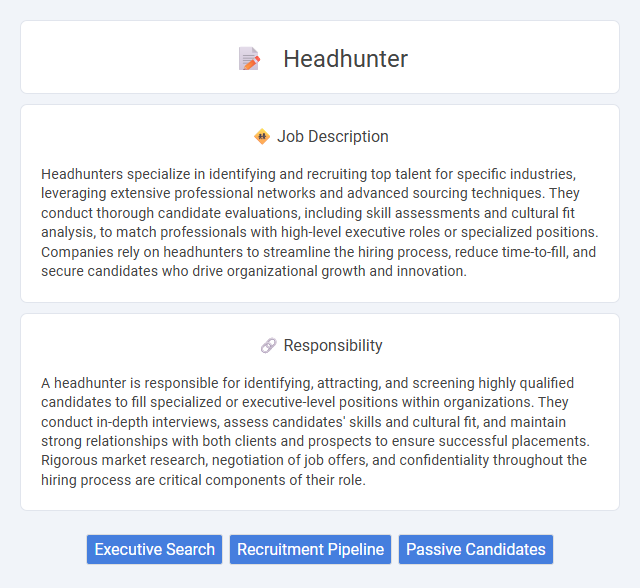
Headhunters specialize in identifying and recruiting top talent for specific industries, leveraging extensive professional networks and advanced sourcing techniques. They conduct thorough candidate evaluations, including skill assessments and cultural fit analysis, to match professionals with high-level executive roles or specialized positions. Companies rely on headhunters to streamline the hiring process, reduce time-to-fill, and secure candidates who drive organizational growth and innovation.
People with strong interpersonal skills and resilience likely have a higher probability of success as headhunters, as the job often requires persistent networking and handling rejection. Those who thrive in fast-paced environments and have an aptitude for understanding both business needs and candidate motivations might prove more suitable. Conversely, individuals uncomfortable with frequent social interactions or high-pressure negotiations may face challenges in this role.
Qualification
A successful headhunter typically holds a bachelor's degree in human resources, business administration, or psychology, paired with strong interpersonal and communication skills essential for talent acquisition. Proficiency in sourcing methods, including LinkedIn Recruiter and applicant tracking systems (ATS), enhances the ability to identify qualified candidates efficiently. Certifications such as SHRM-CP or AIRS provide advanced knowledge in recruitment strategies and labor market trends, supporting effective candidate evaluation and employer alignment.
Responsibility
A headhunter is responsible for identifying, attracting, and screening highly qualified candidates to fill specialized or executive-level positions within organizations. They conduct in-depth interviews, assess candidates' skills and cultural fit, and maintain strong relationships with both clients and prospects to ensure successful placements. Rigorous market research, negotiation of job offers, and confidentiality throughout the hiring process are critical components of their role.
Benefit
Headhunter jobs likely offer significant benefits such as competitive commissions and performance bonuses that can substantially increase overall earnings. Remote work opportunities and flexible schedules might be common, enhancing work-life balance for professionals in this field. Access to extensive professional networks may also improve career growth prospects and industry insights.
Challenge
Headhunter jobs likely present significant challenges due to the necessity of identifying top talent in highly competitive markets. Navigating diverse industry demands and managing client expectations might require advanced communication and negotiation skills. Success may depend heavily on adaptability and persistence in overcoming obstacles during the recruitment process.
Career Advancement
Headhunters specialize in identifying and recruiting top talent for executive and specialized roles, accelerating career advancement by connecting candidates with high-impact opportunities. Their expertise in market trends and industry demands enables professionals to access positions that align with their skills and growth aspirations. Partnering with a skilled headhunter enhances visibility in competitive job markets and facilitates strategic career moves.
Key Terms
Executive Search
Executive search specialists identify and recruit top-level executives, leveraging deep industry knowledge and extensive professional networks to match candidates with strategic leadership roles. They conduct rigorous assessments, market mapping, and confidential outreach to secure high-caliber talent critical for organizational growth and competitive advantage. Expertise in talent acquisition strategies and executive compensation analysis ensures successful placements aligned with company culture and objectives.
Recruitment Pipeline
Headhunters streamline the recruitment pipeline by identifying, screening, and engaging top talent tailored to client needs, enhancing the quality and speed of hires. They utilize advanced sourcing techniques and candidate relationship management tools to maintain a robust talent pool, ensuring continuous pipeline flow. Effective management of candidate pipelines reduces time-to-fill metrics and improves client satisfaction through targeted talent acquisition strategies.
Passive Candidates
Headhunters specialize in identifying and engaging passive candidates who are not actively seeking new job opportunities but possess valuable skills and experience. By leveraging extensive networks, industry insights, and targeted communication strategies, headhunters uncover top talent that competitors may overlook. This proactive approach ensures organizations secure high-caliber professionals who align with strategic goals and company culture.
 kuljobs.com
kuljobs.com